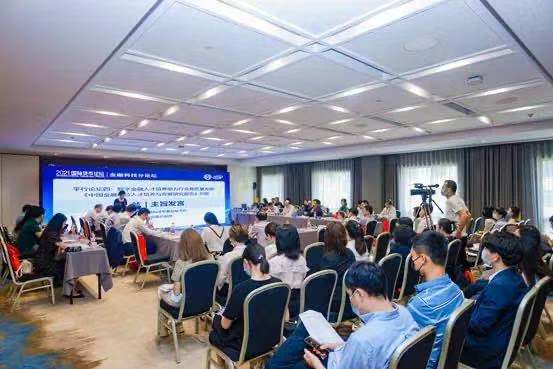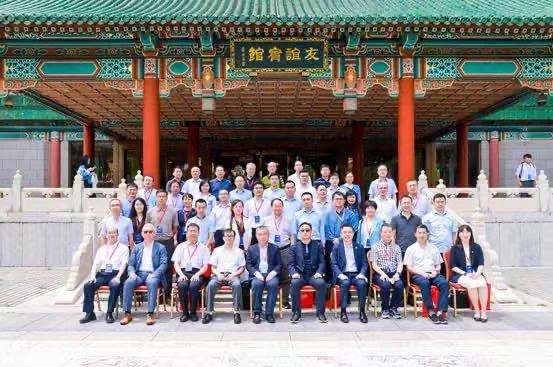2021 International Monetary Forum
2021-07-24 IMI
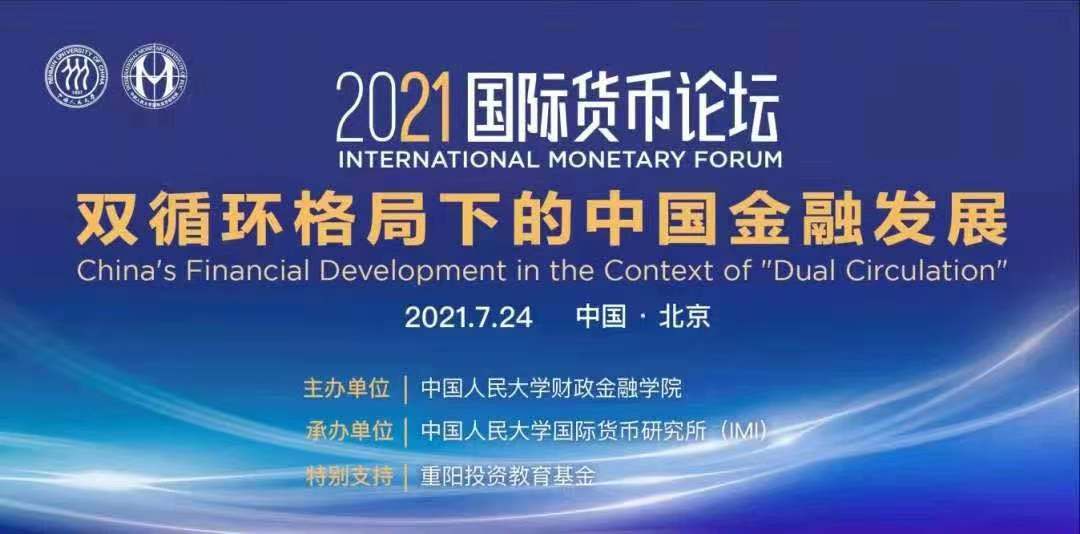
On July 24, the 2021 International Monetary Forum, organized by the School of Finance, Renmin University of China (RUC) and hosted by the International Monetary Institute (IMI), RUC, was successfully held in Beijing. The theme this year was “China's Financial Development in the Context of Dual Circulation”. More than 100 eminent experts and researchers from financial management departments, research institutes and the financial industry attended the forum.They were engaged in extensive discussions on four themes, namely “China’s ‘Dual Circulation’ Development Paradigm and the Internationalization of the RMB”, “Preventing and Mitigating Financial Risks and Securing Financial Security”, “ESG Facilitates the Development of Green Finance” and “The Training of Digital Finance Talents Contributes to Quality Industrial Development”.
The Opening Ceremony and the Launch of 2021 Annual Report of Renminbi Internationalization were hosted in the morning by Zhang Jie, IMI Director.
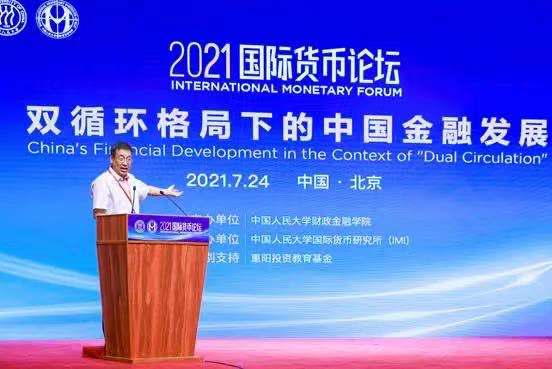
Liu Wei, President of RUC, delivered opening remarks via an online video. He pointed out that topics of great concern under the new development paradigm were as follows: how to rely on the domestic market, make use of both domestic and international resources, improve a modern financial system with high adaptability, competitiveness and benefits for all, build a new financial system with higher-level opening-up, and provide high-level financial support for the key areas and key links of the new development pattern. He hoped the guests would make good use of the International Monetary Forum as a platform to discuss and exchange views on the hot and key issues of financial development in the new paradigm, and hence provide meaningful reference and help for the solution of these issues. Finally, he wished the forum a great success.
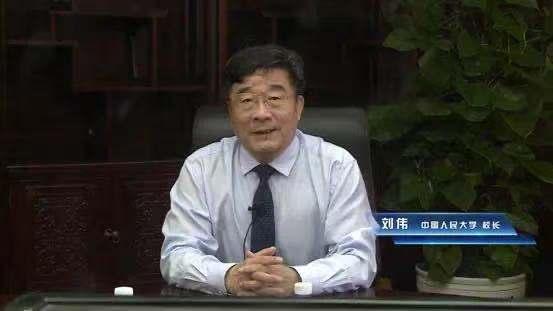
Wang Fang, Deputy Director of IMI and Associate Dean of the School of Finance, RUC, released and interpreted the 2021 Annual Report of Renminbi Internationalization: Dual Circulation Development Paradigm and Currency Internationalization. She pointed out that in the face of shocks from the COVID-19 pandemic and a tense external environment, the RMB was used internationally more significantly year-on-year and steadily ranked among the major international currencies. Accelerating the evolution of the new “dual circulation” development paradigm and promoting quality development will enhance the hard and soft power of the RMB in all aspects and create a major historical opportunity for RMB internationalization to reach a new level. The dual circulation focuses on two key issues of enhancing the ability of supply to create demand and improving the level of national governance domestically, and reinventing the new advantages of international economic cooperation and competition for Chinese companies and institutions through multiple forms of trade innovation internationally; at the same time giving full play to actively promoting the Belt and Road Initiative and the offshore RMB market for the sake of the domestic and international circulation.
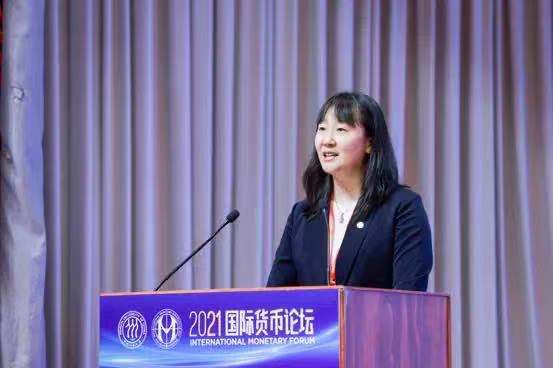
Later on, Li Yang, Member of Academic Committee, CASS and Chairman of Council, National Institution for Finance & Development, Wang Zhaoxing, Former Vice Chairman of China Banking and Insurance Regulatory Commission (CBIRC), Liu Jun, Deputy Secretary of CPC and President of Bank of Communications, Liu Yuanchun, Vice President of RUC, and Wu Xiaoqiu, Dean of Academy of China Capital Market, RUC, respectively delivered keynote speeches.
Li Yang delivered a keynote speech entitled “New Stage of Economic Development, New Tasks of Financial Reform”. He put forward six views on the next step of financial reform. First, to promote the transformation of commercial banks and the reform of pension mechanisms, to promote the insurance industry and various non-banking institutions, and to promote the four finances (commercial finance, development finance, policy finance and cooperative finance); second, to build a capital market with Chinese characteristics in which financial institutions play an important role, allowing banks to gradually open their balance sheets and deregulate financial institutions; third, to adjust the structure of the debt market and risks; fourth, to promote the RMB internationalization, emphasizing the need for financial assets suitable for non-residents to hold; fifth, to strengthen financial infrastructure development; sixth, to vigorously develop financial technology.
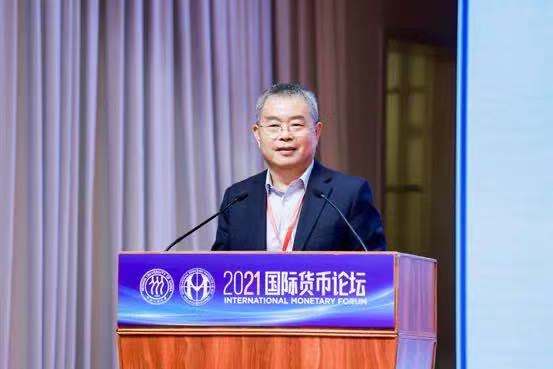
Wang Zhaoxing delivered a keynote speech on the topic of “Views on International Financial Regulatory Rules”. He pointed out that the Basel Accords is the rule that must be referred to and studied in internationalization and international competition. Basel regulatory rules are not set in stone, and China’s financial regulatory authorities are not copying all of them, but focusing on and strengthening the weaknesses and shortcomings of the regulatorysystem, and guarding the bottom line of no systemic risk. First, the Basel Accords places greater emphasis on risk-adjusted capital structure with expanding risk coverage, on corporate governance, information disclosure, and regulatory independence, and on emerging risks. Second, the rules set by the Basel Committee are only a minimum standard. When formulating domestic rules, China has self-adjusted its core tier 1 capital adequacy ratio, leverage ratio, provisioning, treatment of high-risk financial institutions and high-risk institutions, etc.
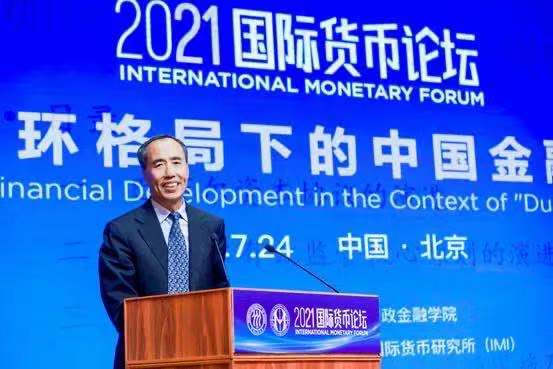
Liu Jun delivered a keynote speech with the title of “RMB Internationalization Rethinking: New Dynamics, New Fields and New Mission”. He pointed out that we had entered a new stage of development, and that with a new development paradigm and new development concepts, a new RMB internationalization pattern should also be shaped. Today, technology has become a major indicator of comprehensive national power, and currency internationalization will face new opportunities and challenges in the era of digital economy, in the context of which, the digital RMB will become the new fulcrum of RMB internationalization, the RMB carbon financial market will become an important vehicle for RMB internationalization, and financial institutions need to give full play to their strengths in technology, scenarios and data, and take on new missions. As we enter the period of “new development stage, new development philosophy, and new development paradigm”, China needs to fully understand the new dynamics and areas of RMB internationalization, and the new mission of financial institutions, so as to help advance RMB internationalization.
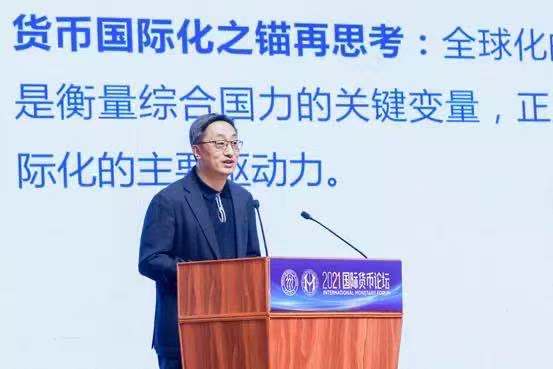
Liu Yuanchun delivered a keynote speech on the topic of “The Current Round of Global Economic Recovery and Financial Reversal”. He pointed out that in the context of accelerating recovery, the key topic for us to track and study comprehensively is the path of debt reduction and risk release. First, policy adjustment will face the double pressure of the current recovery acceleration and future pandemic uncertainty. Second, the cascade between low interest rates and high debt will have an important impact on the sustainability of governments’ debt. Third, whether debt levels will rise further in the future deserves attention. Fourth, there is a need to deepen understanding of potential shocks delivered by financial debt risks, and their scale and destructive power. Fifth, we need to be on high alert for a repeat of the 2013 US taper tantrum.
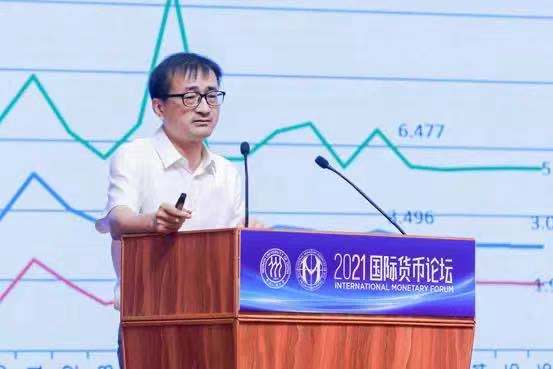
Wu Xiaoqiu delivered his keynote speech via a video, pointing out that the “dual circulation” development paradigmreflects an important transformation of China’s economic development strategy. In the “dual circulation” development strategy, how finance serves the real economy is an issue that must be focused on. First, it is necessary to build an ecologically sound capital market system based on the capital market, and to complete the industrial transformation in the “dual circulation” development strategy and take the road of high-quality development by constructing a new financial industry. Second, we should focus on the future and establish a modern financial concept, and form a new financial industry and a new capital industry based on capital markets. It is important to see that the functional characteristics of this new financial industry is focused on the future. Third, the registration system reform should be further improved. The registration system reform is of great significance and we have made significant progress. We should seriously summarize the experience and problems of the registration system in the past two years.
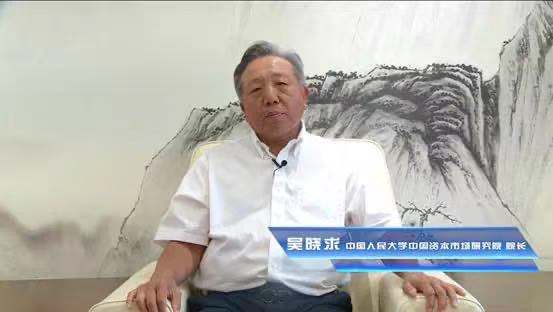
Lastly, Zhang Jie concluded by pointing out that in the past four decades, China’s capital market has been supporting robust growth of China’s economy and hence fulfilled its macro responsibility remarkably. China’s capital market had its unique features and is bound to retain such features. In terms of the internationalization of the RMB, theoretically speaking, the RMB appears to have to follow the paths of the GBP and the USDto become a currency of a major country. From a historical perspective, however, the RMB will not become a major currency unless it blazes a trail. As for the economic policy toolkit, the reason why economic policies adopted by governmentsduring the pandemicwere ineffective is that the pandemic took a heavy toll on “people” but there was a lack of policy tools used to address problems pertinent to “people”.Economics and finance with Chinese characteristics will not worthy of the name unless they draw inspirations from China’s cultural traditions and tell China’s stories about money and finance.
In the afternoon, four parallel forums were held.
Parallel Forum One was held on the theme “China’s‘Dual Circulation’Development Paradigm and the Internationalization of the RMB” and was moderated by Wang Fang.Wang Yi, Vice President of China Everbright Group, Guo Jianwei, Editor-in-Chief of China Financial Publishing House and Ding Zhijie, Director of Research Center of Foreign Exchange, SAFE, respectively delivered keynote speeches. Over ten guests conducted robust discussions on two roundtable themes, namely “RMB Internationalization Against the Background of China’s ‘Dual Circulation’ Development Paradigm” and “The Evolutionof the International Financial Landscape in the Post-Pandemic Era”. These guests include Wei Benhua, Former Deputy Administrator of SAFE and Former Director of ASEAN+3 Macroeconomic Research Office (AMRO); Fang Xin, President of PBoC Haikou Central Sub-Branch; Chen Weidong, Dean of BoC Academy; Xiao Geng, Director of Institute of Policy and Practice, Shenzhen Finance Institute, CUHK andChairman of Hong Kong Institution for International Finance; Zhao Xijun, Co-Dean of Academy of China Capital Market, RUC; E Zhihuan, Chief Economist at BoC (Hong Kong); Ding Jianping, Deputy Director of Shanghai Institute of International Finance Center and Director of Research Center for Modern Finance, Shanghai University of Finance and Economics; Zhu Mengnan, Deputy Dean of School of Economics, Xiamen University; Fu Chenggang, China’sChief Representative at Abu Dhabi International Financial Center and the Financial Services Regulatory Authority; Tu Yonghong, Deputy Director of IMI; He Qing, Deputy Director of Department of Money and Finance, School of Finance, RUC and (temporary) Assistant to President of Guizhou University of Finance and Economics; and Qian Zongxin, Deputy Secretary of CPC, School of Finance, RUC.
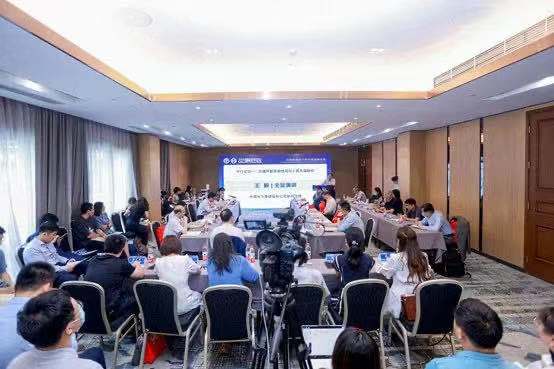
Parallel Forum Two was held on the theme “Preventing and Mitigating Financial Risks and Securing Financial Security”.This forum was a private session and was presided by Ben Shenglin, Co-director of IMI and Dean of Frontier Institute of Regulation and Supervision Technology. Wang Xin, Administrator of PBoC Research Bureau, Wang Guogang, Professor of School of Finance, RUC and Member of Academic Committee, CASS, and Fan Xiwen, Chief Risk Officer at China-LAC Cooperation Fund, respectively delivered keynote speeches. A few guests participated in the roundtable discussion. The guests include Hu Xuehao, Inspector at Department of Finance, MOF and Director of Operation and Evaluation Center for State-owned Financial Assets, MOF; Zhou Daoxu, Director of Research Center for Finance Security, Institute for Fintech Research, Tsinghua University; Qu Qiang, Director of China Financial Policy Research Center, RUC; Chen Zhongyang, Director ofFinancial Risk Management Office, RUC; Peng Hongfeng, Dean of School of Finance, Shandong University of Finance and Economics; Shen Jianguang, Vice President at JD.com and Chief Economist at JDDigits; Lu Weiqing, Head of Anti-Financial Crime Business, QI-ANXIN; and Sun Lilin, founder and CEO of Matrix Elements.
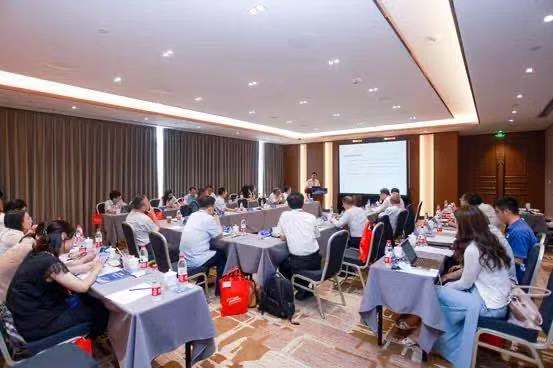
Parallel Forum Three was held on the theme “ESG Facilitates the Development of Green Finance” and was moderated by Lan Hong, Deputy Director of Eco-Finance Research Center, RUC. Cao Tong, Co-Chairman of IMI Council and Chairman of Board, Hande Fintech Holdings,made opening remarks. Zhou Qiuyue, Chief Economist at ICBC and Dean of Modern Finance Academy, ICBC, Ma Xianfeng, Deputy Dean of China Institute of Finance and Capital Markets, CSRC, and Wang Wen, Executive Dean of Chongyang Institute for Financial Studies, RUC, delivered keynote speeches. Zhou Qiuyue, Ma Xianfeng, Guo Jianwei, Cao Tong, Wang Wen, Lan Hong and Zhang Qiang, Executive President of Shenzhen Lead Search Inc., jointly released Standards for Green Finance in the Lead Accumulator Industry.Several guests were engaged in the roundtable discussion on the theme “Transition and Challenges in the Context of China’s ‘30·60’ decarbonization goals”. These guests included An Guojun, Associate Research Fellow at Institute of Finance and Banking, CASS; Chen Yaqin, Director of Product Innovation, Department of Green Finance, Industrial Bank; Guo Jianwei; Meng Meng, Secretary General of Green FinanceCommittee, Guangdong Finance Society and General Manager at Guangzhou Carbon Trading Center Inc.; Wu Aizheng, Director of Renewable ResourcesInstitute, Tianjin University of Commerce and Dean of Guangzhou Institute for Joint Regeneration; and Xu Guangqing, Director of Department of Environmental Economics, School of Environment & Natural Resources, RUC.
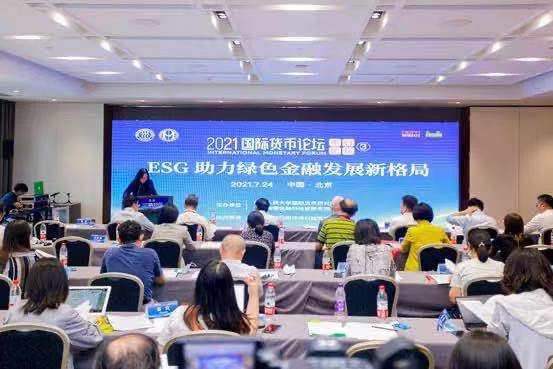
Parallel Forum Four was held on the theme “The Training of Digital Finance Talents Contributes to Quality Industrial Development” and was moderated by Song Ke, IMI Deputy Director and Deputy Secretary of CPC, School of Finance, RUC. Yang Hong, Secretary General of Fintech Committee, China Society for Finance and Banking and Former Inspector at PBoC Technology Department, and Gao Feng, Chief Information Officer at China Banking Association, delivered keynote speeches. Yang Tao, Member of IMI Academic Committee, Member of CFT50 Academic Committee, and Deputy Director of National Institution for Finance & Development, made opening remarks about the2021Report on the Training and Development of China’s Fintech Talents. A number of guests held detailed discussions on two themes, namely “The Training of Digital Finance Talents and Quality Development” and “Fintech Talents and City Competitiveness”. These guests included Yan Wentao, IMI Research Fellow, CFT50Member and President of CCX Credit Technology; Zhang Lin, General Manager at Department of Educational Development, BoC; Xi Hui, Deputy Director of Institute for IT Application in Finance; Ma Hongjie, Vice President of DCITS; Cai Mingjie, Co-General Manager at Department of Digital Finance, China Everbright Bank; Zhu Taihui, IMI Research Fellow and Research Director of Jingdong Digital Technology Research Institute; Song Lu, CFT50 Youth Researcher and Assistant to Dean of National Academy of Development and Strategy, RUC; Liu Yang, Director of Fintech, Beijing Local Financial Supervision and Administration; Niu Zhongyang, Deputy Director of ChengduFinancial Development and Promotion Center; Du Xiaoyu, IMI Research Fellow and Secretary General of Tencent Research Institute; Liu Yong, Member of CFT50 Academic Committee and Dean of Zhongguancun Internet Finance Institute, and Lan Guoyu, IMI Research Fellow and Chief Economist at Dahua Intelligent Technology Co., Ltd. Lastly, Yang Dong, Executive Dean of Blockchain Academy, RUC,gave a presentation on the training of blockchain experts.
